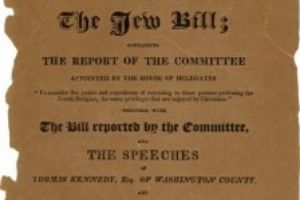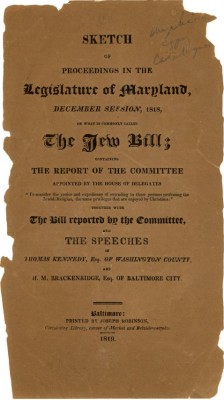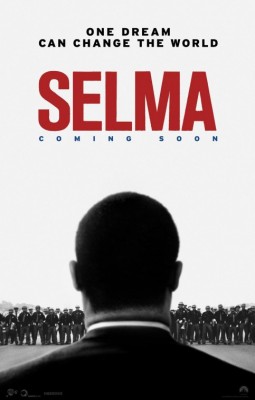The Test

A blog post by Executive Director Marvin Pinkert. To read more posts from Marvin click HERE.
The Senators and Representatives before mentioned, and the Members of the several State Legislatures, and all executive and judicial Officers, both of the United States and of the several States, shall be bound by Oath or Affirmation, to support this Constitution; but no religious Test shall ever be required as a Qualification to any Office or public Trust under the United States. – US Constitution, Article VI (1787)
Many wonderful things happened over the recent winter break. Mitzvah Day was a huge success. We all had fun making jigsaw puzzles for the kids at The Herman & Walter Samuelson Children’s Hospital at Sinai. Gil Sandler gave a terrific talk on some of the colorful characters of early Baltimore. Throughout the next week, we had a steady flow of last minute 2014 gifts to JMM – and we’re very grateful for your generous support.
But for me, the greatest surprise came from a single visitor, Yosef Kuperman. Yosef had come to see The A-mazing Mendes Cohen exhibit. I just happened to be in the lobby when Yosef walked through the door and we struck up a conversation. What I discovered was that Yosef had a most unusual hobby. Beginning with an independent study project he did at UMBC, Yosef had made himself an expert on the “Maryland Jew Bill” – the law that finally overturned Maryland’s required oath to the New Testament. He had studied original speeches, voting data, and correspondence to get a much clearer picture of the forces that shaped this landmark legislation.

Yosef returned to JMM on the afternoon of New Year’s Eve and we were able to have a long talk about what he found and he pointed me to an online resource for speeches that I now happily pass on to you: http://babel.hathitrust.org/cgi/pt?id=loc.ark:/13960/t7kp82p35;view=1up;seq=7 (you will want to skip to page 59, for the start of the relevant speeches).
The current film, Selma, visits the period in our history when “tests” were used to disenfranchise voters. My conversation with Yosef reminded me of the long history of so-called “tests” to deprive people of equal rights. The American experience has its roots in the “test acts” of 1673 in England. The acts which required office holders to disavow transubstantiation and the invocation of saints was designed to bar Catholics from public service (these tests remained English law until 1828). In America several states in rewriting there constitutions in 1776 replaced these detailed tests with a single oath to either affirm Christianity or the New Testament. The US Constitution of 1787, quoted above, would appear to have settled the question, but that was not the case. Maryland maintained its oath requirement, at least on paper, decades after the US Constitution was ratified.
Solomon Etting is generally credited with initiating the repeal effort in 1797, but all attempts at passage before the War of 1812 failed. I was aware of the fact that in the immediate post-War period the oath became a political wedge issue – with Democrats generally supporting repeal and Federalists weighing in on trying to preserving Maryland’s agrarian interests against the “foreigners” of Baltimore. What Yosef brought to my attention is that by 1823 when the Jew Bill again fails to pass, the Federalists are already in decline and that there are many Democrats who are ardent opponents of the legislation. What becomes clear from reading the speeches of the period is that many office holders came to Annapolis having made a pledge to their constituents on this issue. In some instances, it seems to have served as a proxy for proving their own Christian character to their districts.
I encourage you to visit the website I have provided and read for yourself the arguments made in favor of religious tolerance. I think you will find some of the rhetoric surprising, particularly Delegate Worthington’s case for attracting a larger Jewish community to improve the state’s economy. I think you will find some of the public debate about religious liberty has echoes in our own time as well. Perhaps we are not through with the real “test.”

